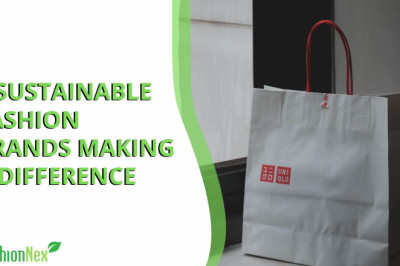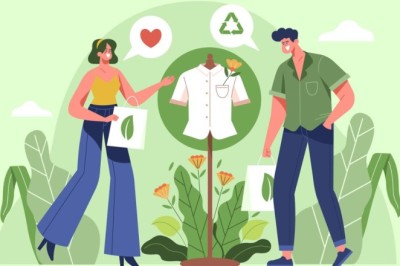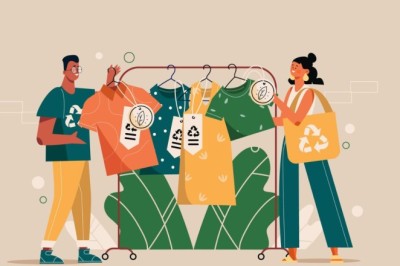views

When clothing, accessories, and footwear are produced and used in a way that minimizes their harmful effects on the environment and encourages social responsibility, this is referred to as sustainable fashion. Due to rising awareness of the detrimental effects of the fast fashion industry on the environment and the individuals involved in its creation, this idea has attracted a lot of attention in recent years.
This article explores how sustainable fashion may be used to help communities and empower women as a vehicle for social change. We seek to inspire people and organizations to think about sustainable fashion as a way to promote social and environmental responsibility by emphasizing the beneficial effects that sustainable fashion efforts can have.
Empowering Women Through Sustainable Fashion
-
Women's Roles in the Fashion Industry
Only a small portion of fashion brands are owned and controlled by women due to the historical exclusion of women from leadership positions in the fashion industry. The negative social and environmental effects of the fashion industry, such as dangerous working conditions and textile waste, also disproportionately affect women.
-
Sustainable Fashion as a Means of Empowering Women
By giving women the chance to take the lead and participate in socially and environmentally conscious fashion initiatives, sustainable fashion offers a way to empower women . Women can, for instance, run ethical production-practice enterprises that value sustainable fashion and encourage female workers and craftspeople. Through education and training programs that offer information and skills connected to sustainable fashion design and production, sustainable fashion can also empower women.
Examples Of Women-led Sustainable Fashion Initiatives
There are several examples of women-led sustainable fashion initiatives that are empowering women and promoting social change. For instance, The Renewal Workshop is a women-led company that works to reduce textile waste by repairing and reselling used clothing. Another example is Indigenous, a sustainable fashion brand that partners with women artisans in Peru and supports their traditional craft practices while providing them with fair wages and access to international markets.
Supporting Communities Through Sustainable Fashion
-
Impact of the fashion industry on Communities
The fashion industry has significant economic, social, and environmental impacts on communities around the world. The production of clothing and accessories often involves the exploitation of labor, the depletion of natural resources, and the generation of waste and pollution. Additionally, the fashion industry often prioritizes profits over the well-being of the communities where it operates.
-
Sustainable Fashion as a Means of Supporting Communities
Sustainable fashion can provide an alternative to the negative impacts of the fashion industry by supporting local communities and promoting responsible production practices. Sustainable fashion initiatives can support communities by creating jobs, preserving traditional craft practices, and investing in sustainable development projects.
Examples of Sustainable Fashion Initiatives that Support Communities
There are several examples of sustainable fashion initiatives that are supporting communities around the world. For instance, Patagonia, a sustainable fashion brand, invests in grassroots environmental organizations and supports community-based solutions to environmental problems.
Another example is Kmana, a sustainable fashion brand that partners with local artisans in Bali and provides them with fair wages and access to global markets while preserving traditional craftsmanship.
Related: Sustainable Fashion Brands Making a Difference
Challenges and Opportunities in Sustainable Fashion
Challenges Faced by Sustainable Fashion Initiatives
Numerous obstacles must be overcome for sustainable fashion to succeed, such as the high cost of sustainable materials and production, the lack of readily accessible markets, and consumer demand for quick and inexpensive design. Additionally, typical fashion firms that put money above social and environmental responsibility may make it difficult for sustainable fashion initiatives to compete.
Opportunities for Growth and Development
The sustainable fashion sector offers several chances for expansion and advancement despite its difficulties. For instance, technology can be used by sustainable fashion initiatives to cut waste and enhance production procedures while also creating cutting-edge materials and design techniques. A growing customer desire for ethical and environmental products may also be satisfied by sustainable fashion.
Importance of Collaboration in Sustainable Fashion Initiatives
Collaboration is essential for addressing the challenges and seizing opportunities in a sustainable fashion. Brands, producers, and consumers must work together to promote sustainable production practices and increase awareness of the importance of sustainable fashion.
For example, the Better Cotton Initiative brings together farmers, producers, and retailers to promote sustainable cotton production and improve the livelihoods of cotton farmers.
Similarly, the Sustainable Apparel Coalition is a collaborative effort among brands, suppliers, and civil society organizations to promote sustainable practices throughout the fashion industry. By working together, stakeholders in the sustainable fashion industry can create positive social and environmental impacts.
Related: How to Make Your Fashion Choices More Sustainable
Fashionnex Final Words
To sum up, sustainable fashion can influence society for the better by empowering women and assisting local communities. Initiatives for sustainable fashion can create jobs, protect traditional craft techniques, and encourage responsible resource management by emphasizing ethical and sustainable production methods.
The need for innovation and teamwork to handle intricate social and environmental issues is one of the major obstacles facing sustainable fashion, nevertheless. The joint efforts of people, organizations, and decision-makers will determine the success of sustainable fashion in the future. Sustainability must be prioritized, and responsible consumption must be encouraged.
By choosing to purchase from companies that have a strong emphasis on sustainability and by taking a more thoughtful approach to our wardrobe decisions, we as consumers can support sustainable fashion initiatives.











Comments
0 comment